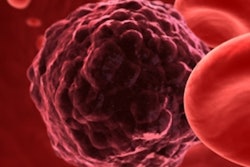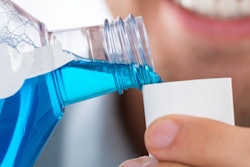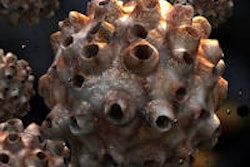Doxepin rinse may prove to be an option to help relieve pain associated with oral mucositis in patients with head and neck cancers, according to a new study in the Journal of Clinical Oncology (April 14, 2014).
A randomized, double-blind, placebo-controlled trial was done by the Alliance for Clinical Trials in Oncology cooperative group, which enrolled 155 patients being treated at 26 U.S. cancer centers between December 2010 and May 2012. Patients were undergoing radiotherapy to a minimum planned dose of 50 Gy and experiencing mucositis-related pain of 4 or higher on a 0 to 10 scale.
Study participants were randomized evenly to receive either doxepin (25 mg diluted to 5 mL with 2.5 mL of sterile or distilled water) on day one, then using a placebo on a subsequent day (group A), or placebo on the first day followed by the doxepin rinse (group B). Patients in both groups were instructed to swish the solution in their mouth for one minute, gargle, and expectorate.
A reduction in pain using assessments based on the Oral Mucositis Daily and Weekly Questionnaires -- Head and Neck Cancer, administered at baseline and five, 15, 30, 60, 120, and 240 minutes for each treatment group was the primary end point of the study.
Researchers found the mean reduction in mouth and throat pain was significantly greater with doxepin than with a placebo, -9.1 and -4.7, respectively (p < 0.001). Intrapatient changes of +4.1 for group A and -2.8 for group B were determined through crossover analyses, equivalent to a treatment difference of -3.5 (95% confidence interval, -5.1 to -1.8; p < 0.001), for doxepin versus placebo.
Researchers noted that adverse effects of doxepin were generally mild. Stinging and burning were significantly higher with doxepin, being highest five minutes after rinsing. The sensations while reduced, remained statistically significant over the four-hour postrinse assessment.
Patients preferred the taste of the placebo (5.5) to the doxepin (7.7). After five minutes, however, both were deemed acceptable: doxepin was 2.9 and placebo 1.6.
No significant differences were reported in the use of additional analgesics following use of the rinse or placebo. Drowsiness was associated more with doxepin; however, differences with placebo did not reach statistical significance until assessment at two hours (3.9 for doxepin versus 2.8 for placebo; p = 0.02). The researchers noted that some patients said the rinse's sedative effect was a beneficial sleep aid.
Notably, the researchers reported that 63% of patients (n = 81) chose to continue using doxepin rinse at the conclusion of the trial, with more patients in group A indicating a desire to continue treatment than in group B. Among those who continued the treatment, 14 (17%) subsequently stopped, citing burning discomfort and increased drowsiness.



















